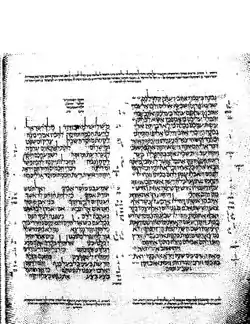Proverbs 26
Proverbs 26 is the 26th chapter of the Book of Proverbs in the Hebrew Bible or the Old Testament of the Christian Bible.[1][2] The book is a compilation of several wisdom literature collections, with the heading in 1:1 may be intended to regard Solomon as the traditional author of the whole book, but the dates of the individual collections are difficult to determine, and the book probably obtained its final shape in the post-exilic period.[3] This chapter is the last part of the fifth collection of the book,[4] so-called "the Second Solomonic Collection."[5]
| Proverbs 26 | |
|---|---|
 The whole Book of Proverbs in the Leningrad Codex (1008 C.E.) from an old fascimile edition. | |
| Book | Book of Proverbs |
| Category | Ketuvim |
| Christian Bible part | Old Testament |
| Order in the Christian part | 21 |
Text
The original text is written in Hebrew language. This chapter is divided into 28 verses.
Textual witnesses
Some early manuscripts containing the text of this chapter in Hebrew are of the Masoretic Text, which includes the Aleppo Codex (10th century), and Codex Leningradensis (1008).[6]
There is also a translation into Koine Greek known as the Septuagint, made in the last few centuries BC; some extant ancient manuscripts of this version include Codex Vaticanus (B; B; 4th century), Codex Sinaiticus (S; BHK: S; 4th century), and Codex Alexandrinus (A; A; 5th century).[7]
Analysis
This chapter belongs to a further collection of Solomonic proverbs, transmitted and edited by royal scribes during the reign of Hezekiah, comprising Proverbs 25–29.[8] Based on differences in style and subject-matter there could be two originally separate collections:[8]
- Proverbs 25–27: characterized by many similes and the 'earthy' tone
- Proverbs 28–29: characterized by many antithetical sayings and the predominantly 'moral and religious' tone (cf. Proverbs 10–15)
The first twelve verses of this chapter, except verse 2, "Like a flitting sparrow, like a flying swallow, so a curse without cause shall not alight",[9] form a series of sayings on the 'fool',[8] so sometimes are called “the Book of Fools”.[10]
Verse 1
- Like snow in summer or rain in harvest,
- so honor is not fitting for a fool.[11]
- "Honor": may likely refer to "respect, external recognition of worth, accolades, advancement to high position", etc., all of which would be 'out of place with a fool'.[12]
Verse 17
- He who passes by and meddles with strife not belonging to him
- is like one who takes a dog by the ears.[13]
- "Meddles" from the Hebrew word מִתְעַבֵּר, mitʿabber, meaning "to put oneself in a fury" or "become furious"; the Latin version apparently assumed the verb was עָרַב, ʿarav, which has th sense of “meddle”.[14]
References
- Halley 1965, p. 270.
- Holman Illustrated Bible Handbook. Holman Bible Publishers, Nashville, Tennessee. 2012.
- Aitken 2007, p. 406.
- Perdue, L. G. (2012), Proverbs, pp. x–xi
- Aitken 2007, pp. 406, 419.
- Würthwein 1995, pp. 36–37.
- Würthwein 1995, pp. 73–74.
- Aitken 2007, p. 419.
- Proverbs 26:2 NKJV
- Note [b] on Proverbs 26:1 in NET Bible
- Proverbs 26:1 ESV
- Note [a] on Proverbs 26:1 in NET Bible
- Proverbs 26:17 MEV
- Note on Proverbs 26:17 in NKJV
Sources
- Aitken, K. T. (2007). "19. Proverbs". In Barton, John; Muddiman, John (eds.). The Oxford Bible Commentary (first (paperback) ed.). Oxford University Press. pp. 405–422. ISBN 978-0199277186. Retrieved February 6, 2019.
- Alter, Robert (2010). The Wisdom Books: Job, Proverbs, and Ecclesiastes: A Translation with Commentary. W.W. Norton & Co. ISBN 978-0393080735.
- Coogan, Michael David (2007). Coogan, Michael David; Brettler, Marc Zvi; Newsom, Carol Ann; Perkins, Pheme (eds.). The New Oxford Annotated Bible with the Apocryphal/Deuterocanonical Books: New Revised Standard Version, Issue 48 (Augmented 3rd ed.). Oxford University Press. ISBN 9780195288810.
- Farmer, Kathleen A. (1998). "The Wisdom Books". In McKenzie, Steven L.; Graham, Matt Patrick (eds.). The Hebrew Bible Today: An Introduction to Critical Issues. Westminster John Knox Press. ISBN 978-0-66425652-4.
- Fox, Michael V. (2009). Proverbs 10-31: A New Translation with Introduction and Commentary. Anchor Yale Bible Commentaries. Yale University Press. ISBN 978-0300155563.
- Halley, Henry H. (1965). Halley's Bible Handbook: an abbreviated Bible commentary (24th (revised) ed.). Zondervan Publishing House. ISBN 0-310-25720-4.
- Perdue, Leo G. (2012). Proverbs Interpretation: A Bible Commentary for Teaching and Preaching. Presbyterian Publishing Corporation. ISBN 978-0664238841.
- Würthwein, Ernst (1995). The Text of the Old Testament. Translated by Rhodes, Erroll F. Grand Rapids, MI: Wm. B. Eerdmans. ISBN 0-8028-0788-7. Retrieved January 26, 2019.
External links
- Jewish translations:
- Mishlei - Proverbs - Chapter 26 (Judaica Press) translation [with Rashi's commentary] at Chabad.org
- Christian translations:
- Online Bible at GospelHall.org (ESV, KJV, Darby, American Standard Version, Bible in Basic English)
- Book of Proverbs Chapter 26 King James Version
 Book of Proverbs public domain audiobook at LibriVox Various versions
Book of Proverbs public domain audiobook at LibriVox Various versions